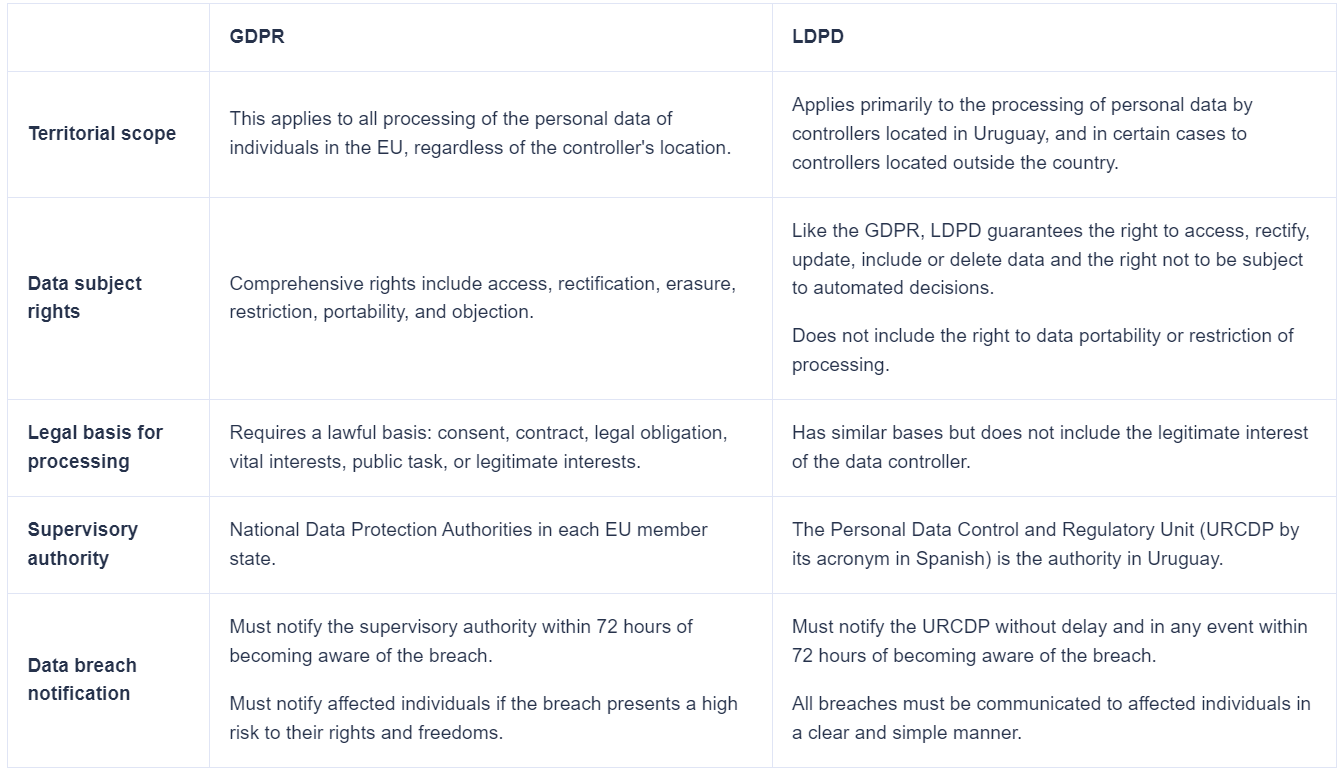Any business that handles information from European citizens is affected by the General Data Protection Regulation (GDPR), which establishes a strict framework for the processing and protection of personal data. GDPR compliance is a legal duty and a key tool for gaining customer trust and strengthening reputation and commercial relationships in an ever more challenging digital environment.
Uruguay has followed the lead of the European Union in adapting its legal framework for the protection of personal data. Law No. 18,331 of Protection of Personal Data and Habeas Data Action (LDPD) and its updates have been aligned with GDPR standards. Furthermore, in 2012, the European Commission recognised Uruguay as adequate in terms of data protection (Decision No. 2012/484/EU, dated 21 August 2012). Later, the country ratified European conventions, such as Convention 108+ for the protection of individuals with regard to the automatic processing of personal data. This makes Uruguay an attractive option for companies looking to enter Latin America without compromising compliance with European regulations.
In this blog, we will look at how Uruguay's regulations compare to the GDPR and why it should be considered if you are establishing business relationships in Uruguay or operating in the country.
Differences between the GDPR vs LDPD
While both laws aim to protect personal data and ensure privacy, they differ in their specific requirements, scope, and enforcement mechanisms. The GDPR, with its comprehensive and stringent standards, applies to all entities processing personal data within the EU and to EU residents, with an emphasis on detailed compliance and significant penalties. In contrast, the LDPD focuses primarily on data processing by entities within Uruguay. It features a more flexible approach to data protection obligations and penalties, in line with Uruguay's legal and regulatory environment.
For easy comparison, here is a table of the main differences between both laws.


The role of the Personal Data Control and Regulatory Unit (URCDP)
The URCDP is the authority in Uruguay responsible for monitoring the protection of personal data. It aims to ensure that organisations handle data responsibly and that individuals' rights to privacy and the integrity of their personal data are duly respected.
Its main functions include providing free advice to individuals and organisations on compliance with the Personal Data Protection Law (LDPD), issuing regulations, and maintaining a database registry. In addition, it enforces compliance with data security and accuracy standards and performs inspections when necessary. It also has the authority to request information from public and private entities and issue opinions and recommendations on possible sanctions in cases of infringement.
Importance of the LDPD to an EU SME
Uruguay should be considered a country with a similar legal framework to the EU GDPR in terms of data protection. In general, there are no key factors that small and medium-sized enterprises (SMEs) in the EU need to consider when processing personal data of Uruguayan individuals, unless they have a presence there and/or the data controller is in the country. In such cases, several obligations imposed by the LPDP should be considered, such as the registration of databases. This registration is mandatory and must be kept up-to-date, including reporting any changes quarterly. Data breaches must also be reported without delay and clearly communicated to the individuals affected, and an impact assessment must be carried out in situations that may involve high risks to the rights of data subjects.
Compliance with data protection regulations, such as the Uruguayan LDPD, has inherent benefits for EU SMEs. Not only does it help avoid high fines and reputational risks, but it also enhances the company's position as a supplier. Both companies and organisations are increasingly performing thorough assessments of their suppliers, as any breach of the confidentiality of personal data can have a negative impact on them.
Comment